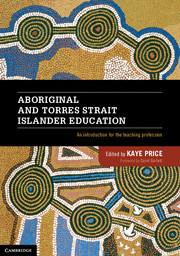Book contents
- Frontmatter
- Contents
- Contributors
- Acknowledgements
- Chapter 1 A brief history of Aboriginal and Torres Strait Islander education in Australia
- Chapter 2 The Stolen Generations
- Chapter 3 Delivering the promise
- Chapter 4 Your professional experience and becoming professional about working with Aboriginal and Torres Strait Islander students and communities
- Chapter 5 The ‘silent apartheid’ as the practioner’s blindspot
- Chapter 6 Better
- Chapter 7 Maths as storytelling
- Chapter 8 Information and communication technologies in the classroom
- Chapter 9 Language and literacy
- Chapter 10 Aboriginal and Torres Strait Islander Studies in the classroom
- Chapter 11 Engaging Indigenous students
- Appendix A Take a book: Any book
- Appendix B1 Terminology
- Index
- References
Chapter 11 - Engaging Indigenous students
The important relationship between Aboriginal and Torres Strait Islander students and their teachers
- Frontmatter
- Contents
- Contributors
- Acknowledgements
- Chapter 1 A brief history of Aboriginal and Torres Strait Islander education in Australia
- Chapter 2 The Stolen Generations
- Chapter 3 Delivering the promise
- Chapter 4 Your professional experience and becoming professional about working with Aboriginal and Torres Strait Islander students and communities
- Chapter 5 The ‘silent apartheid’ as the practioner’s blindspot
- Chapter 6 Better
- Chapter 7 Maths as storytelling
- Chapter 8 Information and communication technologies in the classroom
- Chapter 9 Language and literacy
- Chapter 10 Aboriginal and Torres Strait Islander Studies in the classroom
- Chapter 11 Engaging Indigenous students
- Appendix A Take a book: Any book
- Appendix B1 Terminology
- Index
- References
Summary
I am a Narungga man born on the York Peninsula of South Australia and I now hail from the Aboriginal community of Point Pearce. I have a brother John and baby sister Geraldine. My elder sister Lorraine is deceased. I attribute my success in life to the close relationship I have with my family; this has kept me culturally strong and focused on community needs as my career has developed over the years. I am proudly married to Mary and we have two children Peter and Lorraine. I firmly believe that being a husband and father are the most important roles I have in life. Along with Mary I also have the privilege of providing care to our nephews and nieces from time to time when necessary.
My early years were influenced by the policy of forced removal from immediate family until I was permanently reunited at the age of six years. I grew up in rural South Australia before moving with my mother and little sister to Western Australia to live in the Pilbara during my teenage years. My mother and maternal grandfather are my heroes because of their resilience and commitment to family with their generosity of love and care. My grandfather, affectionately known as ‘Daddy Buck’, attended my graduation as a teacher in Perth, travelling interstate for the first time to the event.
- Type
- Chapter
- Information
- Aboriginal and Torres Strait Islander EducationAn Introduction for the Teaching Profession, pp. 164 - 180Publisher: Cambridge University PressPrint publication year: 2012
References
- 4
- Cited by



